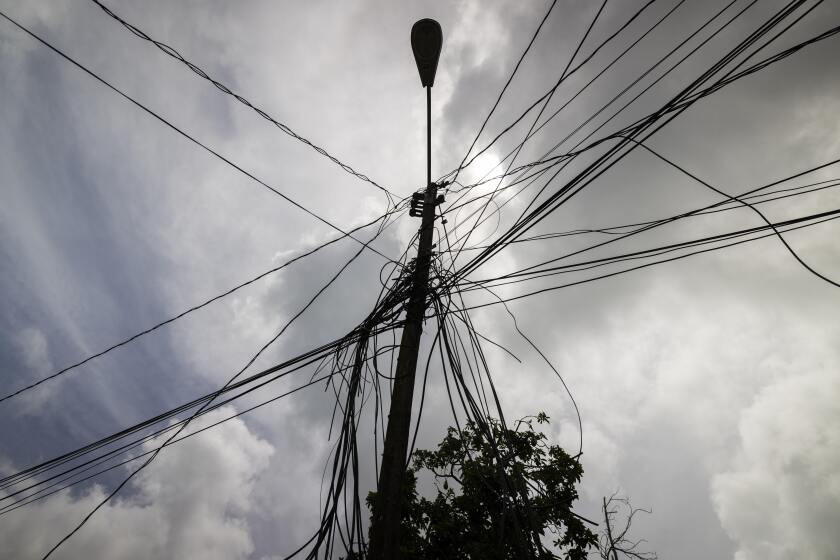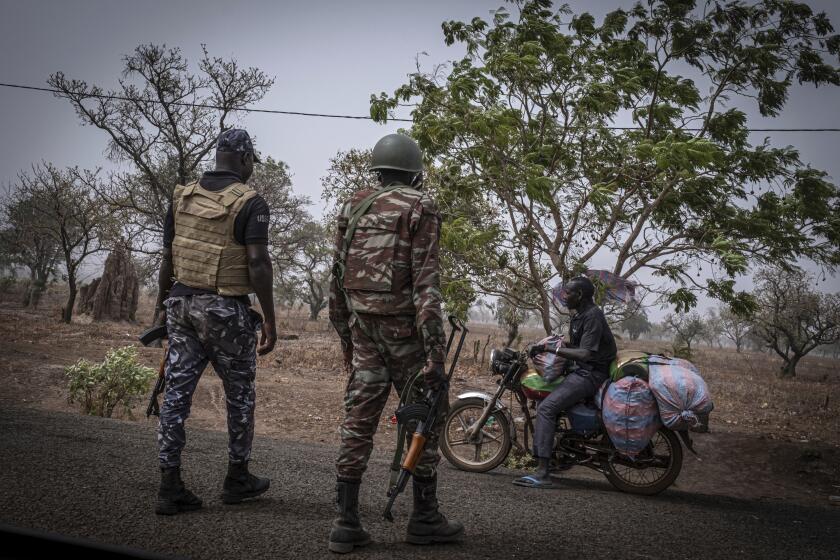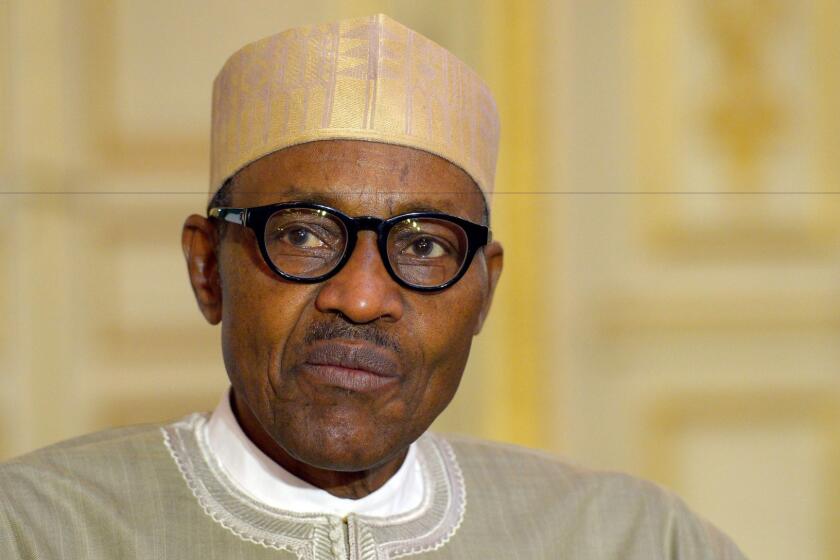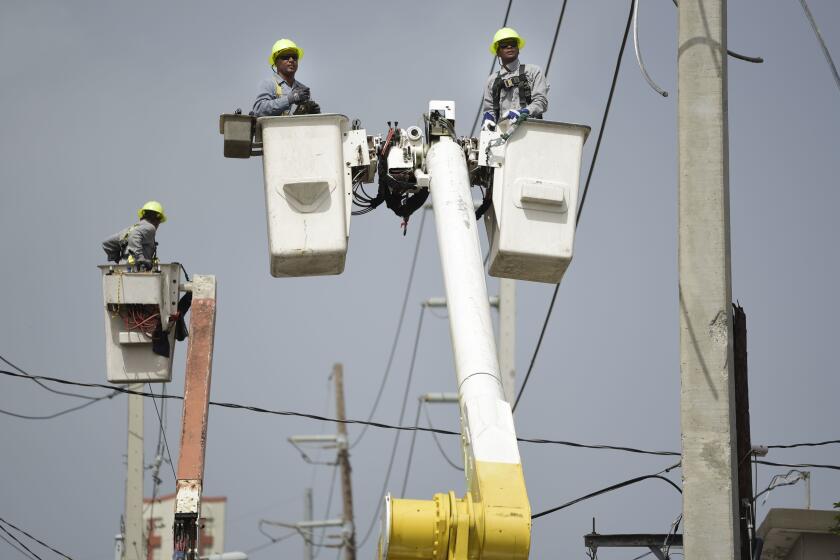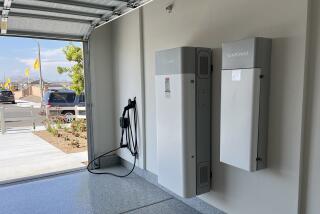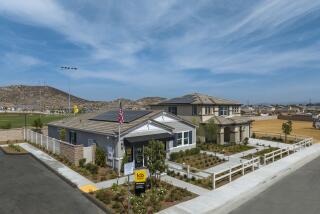Millions in Nigeria have little or no electricity. It’s straining businesses and public services
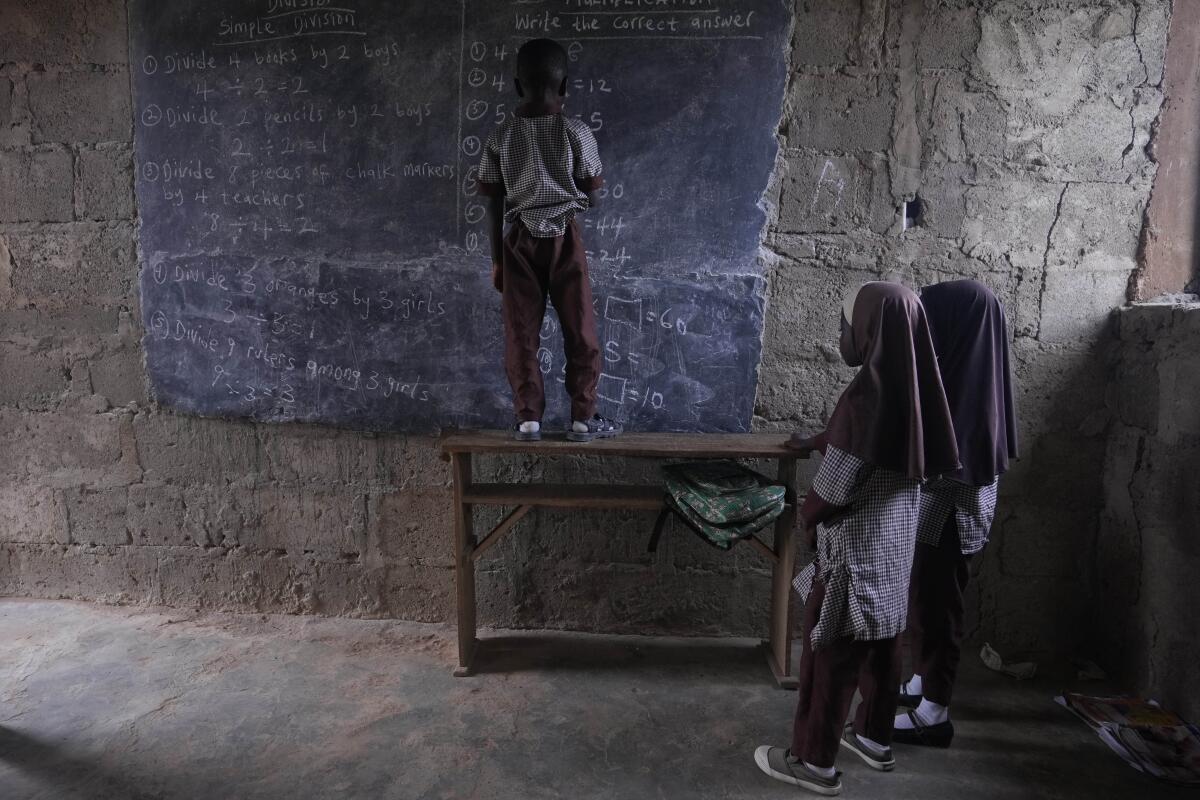
- Share via
IBADAN, Nigeria — Dimly lit and stuffy classrooms stir with life every morning as children file in. Rays of sunlight stream through wooden windows, the only source of light. Pupils squint at their books and intermittently the blackboard as teachers try to hold their attention.
It’s a reality for many schoolchildren across Nigeria, where many buildings don’t have access to the national electricity grid. In Olodo Okin, an impoverished community in the city of Ibadan, Muyideen Raji, the founder of the Excellent Moral School, said “the entire community is not connected, including the school,” It acutely affects pupils, he said, who can’t learn how to use computers or the internet and can’t study in the evenings.
About half of Nigeria’s more than 200 million people are hooked up to a national electricity grid that can’t provide sufficient daily electricity to most of those connected. Many poor, rural communities like Olodo Okin are off the grid entirely.
In a country with abundant sunshine, many are looking to solar energy to help fill the gaps, but getting risk-averse investors to finance major solar projects that would give Nigeria enough reliable energy is an uphill struggle. It means that millions in the country are finding ways to live with little to no electricity.
Africa’s most populous country has ground to a halt as Nigeria’s largest labor unions begin striking to demand a salary increase.
Lots of sun, few funds
Studies have shown that Nigeria could generate much more electricity than it needs from solar energy, thanks to its powerful sunshine. But the construction of 14 grid-scale solar projects in the northern and central parts of the country that could generate 1,125 megawatts of electricity has stalled since contracts were signed in 2016.
Those trying to develop solar projects blame interest rates for borrowing which can be as high as 15%, two to three times higher than in advanced economies and China, according to the International Energy Agency.
That means it’s more costly for solar companies to work in Nigeria or other developing nations than in rich countries. Africa only has one-fifth the solar power capacity of Germany, and just 2% of global clean energy investments go to the continent.
“The same project put up in Nigeria and Denmark; the Danish project will get funding for 2 to 3%” interest rate, said Najim Animashaun, director of Nova Power, one of the stalled solar projects. Meanwhile he struggles to get loans even with interest rates of 10% or higher, “even though my solar project can produce 2½ times more power,” than a Danish one.
A power company in Puerto Rico has restored electricity to most areas affected by a massive outage that hit the U.S. territory this week.
Nigeria also does not set so-called cost-reflective tariffs, meaning the price consumers pay for electricity doesn’t cover the costs to produce and distribute it. This means distribution companies can’t fully pay producers and the industry relies on government interventions to stay afloat, scaring off lenders from investing in the solar industry.
Currently, power producers say they are owed up to $2.7 billion by the government, making it difficult to meet obligations to their lenders and contractors.
One option would be getting World Bank guarantees that would put investors at ease and make them more willing to put money into solar projects — but the government is wary of signing on to any scheme that would force it to pay large sums even if electricity from the projects does not get to the consumers because of inadequate transmission and distribution infrastructure.
Without World Bank guarantees, however, “nobody will develop or finance a project with a government subsidy, because it can dry off,” said Edu Okeke, the managing director of Azura Power. Azura Power has a stake in the now-stalled 100-megawatt Nova solar project in Nigeria’s northern Katsina State.
A lot is at stake, with mounting evidence jihadi fighters who had long operated in the Sahel region have crossed from Benin and settled in Nigeria.
Stopgap solutions
With less than 8,000 megawatts of capacity and an average supply of less than 4,000 megawatts — less than half of what Singapore supplies to just 5.6 million people — power outages are an everyday occurrence in Nigeria.
Communities like Olodo Okin in Ibadan that have no access to electricity are often surrounded by more fortunate ones that are connected to the grid but experience frequent outages and have to use gasoline- and diesel-run private generators.
With the long-running petroleum subsidies now removed, many households, schools, hospitals and businesses struggle with the cost of the fuel for their backup generators.
“We have stopped using a diesel generator as an alternative due to costs,” said Abdulhakeem Adedoja, the head of Lorat Nursery and Primary School in Ibadan. He added that although the school is in an Ibadan area that is connected to the grid, it’s gone as much as two weeks at a time without a power supply.
The problem is not just the lack of electricity for computer-aided learning, proper lighting and fans to make classes less stuffy for pupils and teachers, but also that students are unable to complete their school assignments at home, Adedoja said.
It’s a tough time in Nigeria’s civil service.
For energy-dependent small businesses like restaurants, they either close shop or continue with alternative power generation, incurring high costs that hurt their capacity for expansion.
Ebunola Akinwale, the owner of Nature’s Treat Cafe in Ibadan, said she pays $1,700 monthly to power backup generators in her four branches.
“If nothing changes, I probably would have to close one or two branches,” she said, though she is planning to go solar, which she enthuses will help us cut “pollution from the diesel [generators].” She’s in talks with her bank for a low-cost loan package especially designed for young women entrepreneurs to finance the solar alternative.
However, not every business and household has such access or can afford the upfront capital for a private solar system. School heads Raji and Adedoja said they find the costs prohibitive.
Finding a way forward
The stalled solar projects aren’t happening as finances don’t add up, but even for other sources of electricity generation, Nigeria struggles to attract desperately needed private financing.
The power minister, Adebayo Adelabu, said in May that to address the financial crisis affecting the electricity sector, prices must reflect the true costs of service because a broke “government cannot afford to pay 3 trillion naira [about $2.4 billion] in subsidy.”
The government also insists that Nigerians paying fully for the electricity they consume would encourage investments in the sector.
There has been some pushback to that, as labor unions went on strike in early June in part to protest electricity tariff increases.
The increase will affect 1.5 million households connected to the grid, which continues to crumble amid a lack of maintenance after Hurricane Maria in 2017.
But businesspeople like Akinwale understand the government’s position because regularly supplied grid electricity, even without a subsidy, is “still cheaper and cleaner” than diesel for generators, she said.
If finances for grid-scale solar projects do not add up, the government should offer incentives such as tax relief and payment plans to encourage private solar adoption, Akinwale said. “Sunlight is there abundantly,” she said.
Former regulatory chief Sam Amadi doubts if consumers in Nigeria — where the minimum wage is $20 a month — “can today pay for energy consumed without subsidy.” He also wants a policy that makes it more affordable to have smaller-scale solar projects dotted across communities, businesses and homes.
Until then, there are consequences to the frequent blackouts, he said.
“I have the story of a person who died in hospital because the electricity went out during operation,” he said. “Every day, we see the real-world effects of the lack of electricity.”
Adebayo writes for the Associated Press.
More to Read
Sign up for Essential California
The most important California stories and recommendations in your inbox every morning.
You may occasionally receive promotional content from the Los Angeles Times.

